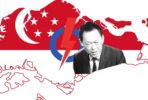THE STALLED WATER TALKS BETWEEN Malaysia and Singapore can now restart only with a meeting of the two Prime Ministers. The two negotiating teams cannot overcome the impasse, for one does not understand the other and the other only too well. For the talks to resume, Singapore must ask for it. But she would not without some guarantees from Malaysia. Singapore botched the talks, in the Malay mind, when she revealed confidential documents in an unresolved issue. And proved she would in future in a regional dispute when she published confidential correspondence between Singapore and Indonesia over trade statistics. Singapore insists the letter of the law must be honoured.
Malaysia has now released a series of advertisements putting her case public for Singapore to rebut when, if, talks resume. The National Economic Action Council (NEAC) placed the advertisements but behind it is the Prime Minister, Dato’ Seri Mahathir Mohamed’s deft hand. It is brilliant. It tells Singapore what she must resolve before an amicable settlement. It is also pointless. Malaysia need not have to make its case public. For Singapore is painted into a corner. It is all but impossible for the talks to resume until the two Prime Ministers, Dr Mahathir and Mr Goh Chok Tong, meet in Putra Jaya. Both Malaysia and Singapore know this. But Dr Mahathir is on his way out, and it would be Dato’ Seri Abdullah Ahmad Badawi, who would in his place. Would Singapore allow it or send in the deputy prime minister instead? More than the water talks, Dr Mahathir has raised the spectre of, to use the current buzz-word, regime change in Singapore.
Singapore ignores the historical past. Why did Malaya, as she then was, agree to three cents (the sen came later) per 1,000 gallons in the agreements of 1961 and 1962? Johore had wanted a far higher price, but Singapore was making its case to join Malaysia, and the then Prime Minister, Tengku Abdul Rahman Putra, decided that since the two states would be in the newly formed Malaysia, there was no need for the island state to pay too high a price. But Singapore left the Malaysian federation two years later in 1965. The agreement provides for a review after 25 years, and when the purchasing value of the dollar declines. Singapore does not accept this. She did not in 1986 and 1987, and that was unravelled only when the then Singapore prime minister, Mr Lee Kuan Yew, came to pay, in the Malay mind, homage to Dr Mahathir. That is how it is view here. Nothing can erase that.
Singapore goes for broke in talks when there is political uncertainty in Malaysia. In 1986 and 1987, Dr Mahathir was fighting for his political life. UMNO had been declared an unlawful political organisation by the courts, and few concentrated their attention on the water talks. It is an issue now when there would be a new Prime Minister of Malaysia in three months. And stumbled in both because the Malays close ranks when there is an external threat like this, when an outsider tries to take advantage of internal mayhem. If anything, the new Prime Minister, Dato’ Seri Abdullah, must, indeed would, be unbendable in the water talks.
Malaysia has over the years created an efficient smokescreen with a number of pointless issues, which Singapore saw as proof of Kuala Lumpur’s perfidy. The second bridge, the needless quarrel over the CIQ, the railway land, and others were brought out for the end game. At first I wondered why but it was a deliberate plan of Dr Mahathir’s to seize the advantage in Malaysia’s favour. He has. It would not be easy for Singapore under his successor, or the successor of his successor, to reach agreement without the two prime ministers meeting.
In the next stage in the talks, over raising the price Singapore pays for water, a similar deadlock has occurred: the Singaporeans insist on its pound of flesh and it is not agreed presses for a public humiliation of Malaysia. All that matters in Singapore is the present, devoid of the historical past, framed in graphs and pie charts. And she cannot understand a Malaysia, for all its commitment to a technological future, is still mired in a cultural and religious mindset. In Malaysia, there is an acceptance that nations, no matter how powerful, blunder through, and that must be taken into account in every matter. Especially in talks.
Singapore does not understand or accept this. Which is why a think tank in the republic holds a seminar next month on the Malay mind, with two prominent Malaysians, neither Malay, leading it in an attempt find an instant answer. Could cultural forms be understood and learnt at seminars like this if the national mood is to drag the other side’s nose to the ground? When Singapore positions itself, with Israeli help, as a Chinese island in a hostile Malay sea, as Israel in the Middle East, and believes its military might could flatten its neighbours armed might at the onset of hostilities, and conducts its talks with its neighbours as it does, is it not inevitable that many in Malaysia believe that this issue must result in open hostilities? Especially when it was Singapore that began the military arms race with Malaysia when she bought tanks in the late 1960s. And continue to taunt the Malaysian armed forces by her military aircraft straying deep into Trengganu and Kelantan and back into international waters when the RMAF jets scramble from Kuantan.
Malaysia has quietly shown Singapore over how weak her security is. She has slapped the Singapore armed forces in ways that caused it to come unstuck. The most dramatic was when its commandos invaded its high security air missiles base in Bukit Batok overlooking the Straits of Johore and pasted Malaysian stamps on the missiles and replaced the Singapore flag on the commanding officer’s table with the Malaysian flag. Several Singapore officers resigned or were reassigned or demoted. The major who carried it out, who is known by his nickname, Sam, is still around and in the business.
Malaysia believes this tough talk on water is to force the issue to be resolved on the battlefield. A book on Singapore’s armed forces suggest it as a way of reinforcing its own security and ensuring the republic gets all the water she needs. When Jordan said she would divert a river from the Lake Galilee for agricultura, Israel warned Amman that would be a cause for war. Malaysian defence planners say that its armoury is outclassed by Singapore’s. But the Malaysian fighting machine after the war is not. Besides, neither Israel nor the United States would rush to Singapore’s aid should hostilities break out. Not after the quagmire of one in the Middle East and engaging another Muslim nation of the other. As one military planner asked: “Would Singapore cut its nose to spite Malaysia’s face? For should war break out. Singapore would be destroyed no matter what happens. Is that the brinkmanship it displays?” The talks are preferable, but it is Singapore which must ask for it.
Source: http://militaryofmalaysia.net/2008/12/komando-malaysia-intrusion-into-singapore-missile-complex/
EDITOR’S NOTE
Sometimes, we cannot help but wonder why our neighbours are so mean to this tiny island when we have been very helpful and friendly. Just look at what we did for the Malaysians during the MH370 plane disappearance. We were the first few countries to help. That’s what neighbours are for, we look out for each other.
This sounds like a nice ‘scary story telling’ session by the Malaysians. But Singaporeans should not take this ‘story’ lightly.
Hope MINDEF can clarify this matter. This is very serious.








